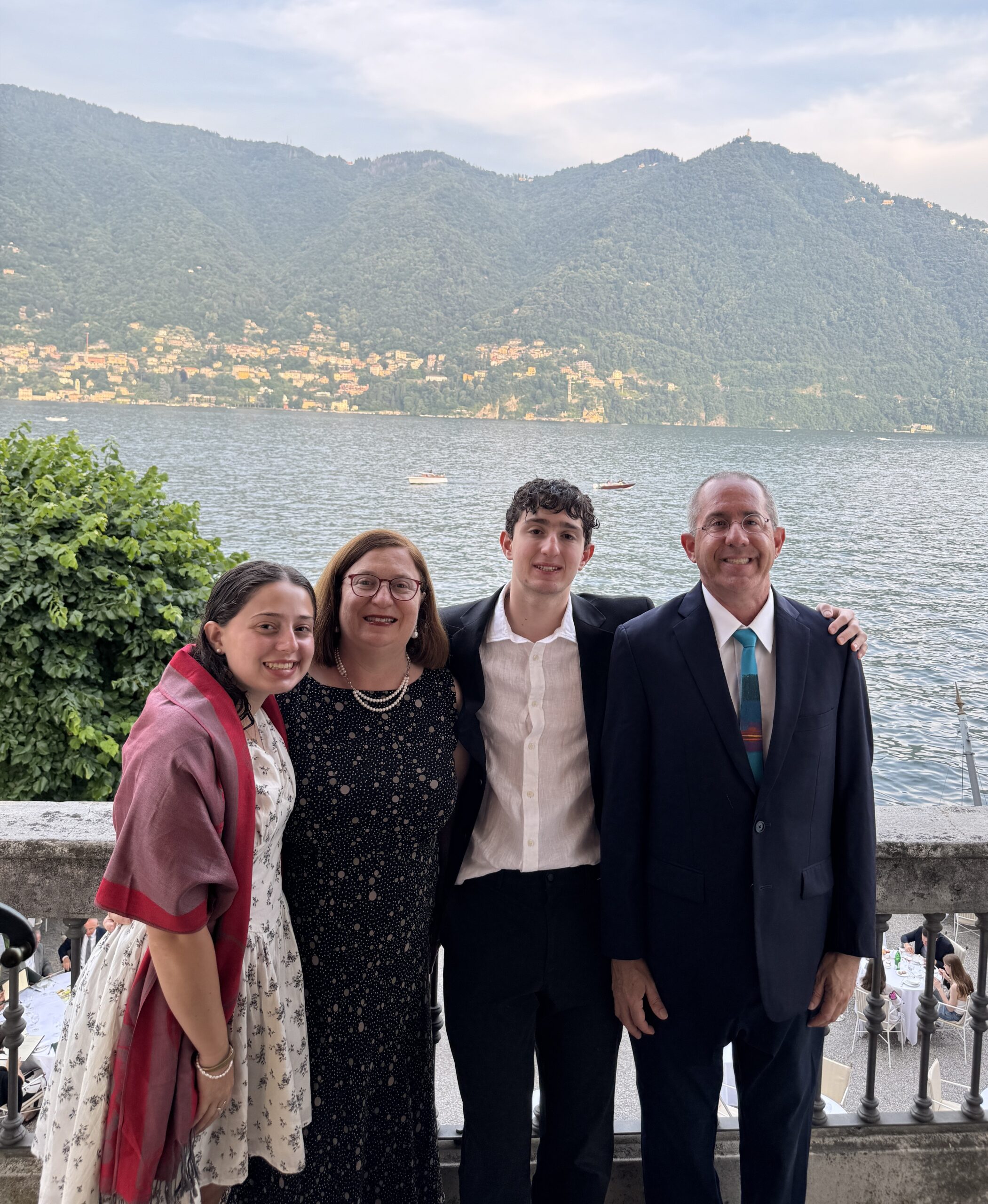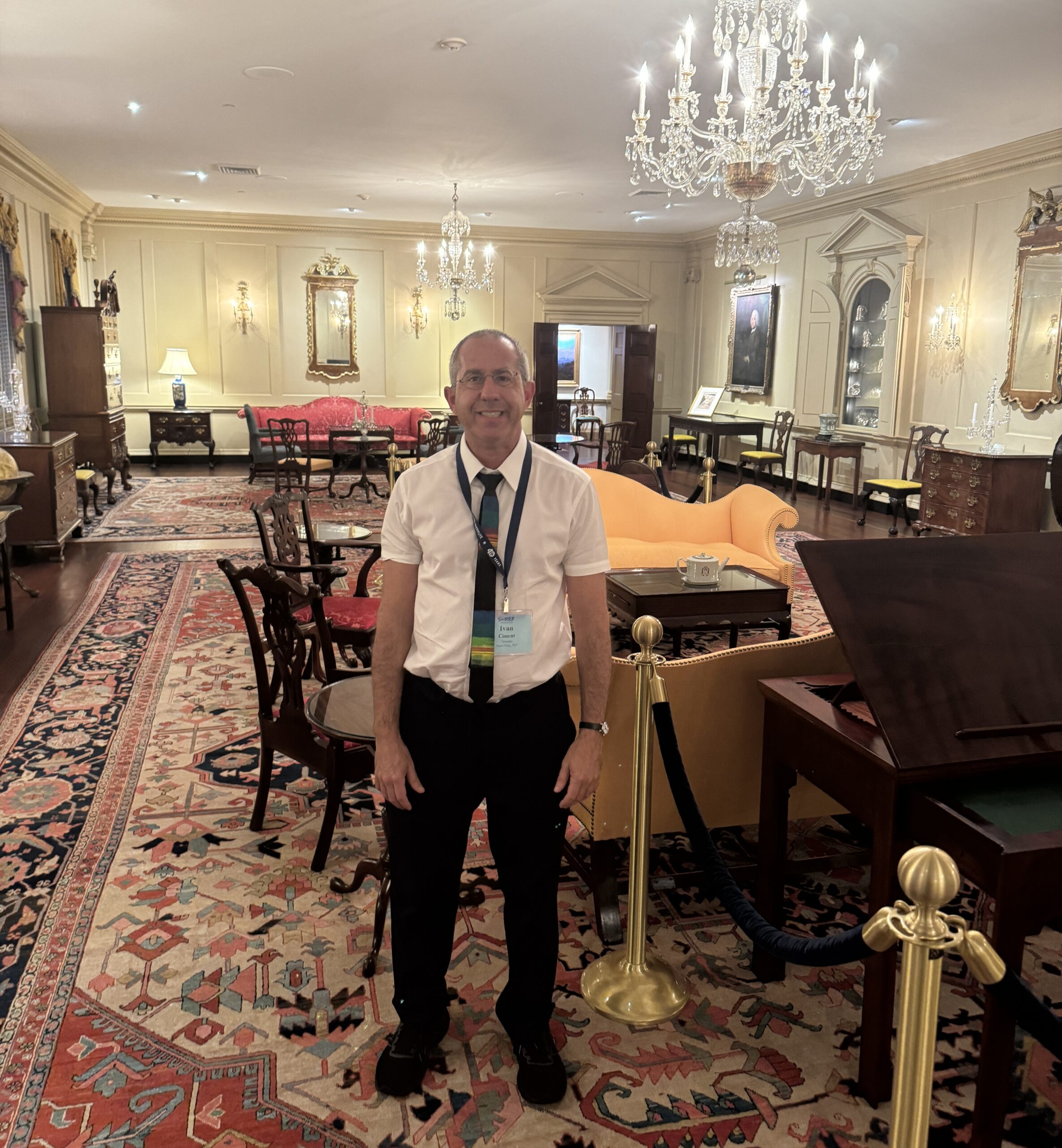
I reached a milestone today. After a quarter century of roommates and a wife, I had to password protect my PC at home. Done in by my 7 year old who decided he likes going to Amazon and seeing what he can buy. Also likes going on YouTube to play videos. And who knows what else?
We were walking around Central Park and came across “The Guitar Man” who is a guy who plays guitar in the park every Saturday afternoon when it is warm enough. He is an institution in the city. During his performance, a wedding couple skated by on roller blades and he played a wedding dance for them “I can’t help rolling away (umm. Falling in love with) from you….” That’s the reward of living in a crazy city like New York.
Every time I go to the gym I pass by this doorway with a sign in it that says “For entry to Psychic, ring the bell or call XYZ phone number.” But if it is a psychic, shouldn’t he or she know that I’m there?
A greeting card I saw today is a sign of our times. It roughly says “I liked you on Facebook. I followed you on Twitter. I linked to you on Linked In….This card is rather unnecessary.”
We bought the kids a dart game and it comes with instructions about all these drinking games they have devised, but then at the bottom of the page there is an asterisk that says “These games are not intended for use with alcohol.” They had in mind cranberry juice instead?
I watched the TV special with Tony Bennett and Lady Gaga and it was nice to see this odd couple doing nice music that shows itself to be timeless. It turns out that Lady Gaga wanted to have a career as a jazz singer but the path she took was far more lucrative. Still, she showed you can be cool and elegant too.
I went to Time Warner Cable’s office to switch out a cable TV box and saw about 100 people standing in line to pay their bills. I asked why and was told that they all have to pay in cash because most of them are illegal immigrants and they don’t have bank accounts or credit cards. You might ask why Time Warner doesn’t have kiosks selling debit cards or just taking cash payments much like people buy subway passes. But the bigger question to me is this – if people go once a month to spend an hour standing on line to pay the cable bill (plus travel to and from), they do this to pay their phone bill, their electricity bill, and so forth. A poor guy or an immigrant probably spends at least the equivalent of a work day per month just standing in line paying bills. To me it would make sense to let illegal immigrants open up small bank accounts up to $5,000 so they could pay their bills and be freed up to actually work. I don’t think we have to worry about money laundering with people having small accounts to pay bills especially if the accounts are tied to a list of approved payees. I’ve been told that companies such as the department stores love the present situation because they can charge more money for people who haven’t enough cash to pay except by installments. But think about all this wasted productivity.
I’m being told that Iranian president Rouhani will be a one-term guy and that there will be no nuclear deal with the US this year. He just went on Iranian TV to insist that there will be a deal. I’m also being told that oil prices will go up next year because there won’t be a deal. Perhaps the US will make a bad deal, just to make a deal. I think the Israelis under either Netanyahu and especially under Lieberman will not live with a bad deal. I do know that the Israelis feel the US is making a mistake by aligning with Iran against ISIS. They feel that Iran is a much more important enemy than ISIS. The Economist seems to think the Iranians want to do a deal because they have more to gain than to lose by doing one, and that oil prices are more likely to stay down. A few months and we’ll see what happens.
Hong Kong is not a big story – nobody in the world really cares about Hong Kong. That territory now only constitutes 2.5% of China’s GDP, much less than it did when the territory was handed over to them in 1997. The Chinese leaders have much bigger fish to fry on the mainland trying to hold power and they are not going to let a bunch of Hong Kong students lead them to show weakness. For that reason, when the students made demands, the government said “how about we give you nothing?” and the rest of the world didn’t say boo. Which was actually wise because when the world started giving the Ukrainians a false sense of backing it led them to fight the Russians and have 2,500 of their soldiers killed this past summer. None of the students died because they didn’t dare think anyone would back them up if they took on the Chinese.
It would be realistic to assume that even after Obama is no longer president, the US will not act very differently in the world, just as it hasn’t acted much differently under Obama than it did under Bush. The US is not really affected by ISIS, the Ukraine, Hong Kong, Syria, Iraq or Gaza. Ebola is a bigger concern because it can kill people in the US. The US doesn’t need to be set off against ISIS just because some American journalist or aid worker goes to Iraq or Syria and gets beheaded. Maybe the president should just say “don’t go there and if you do, don’t expect us to send the cavalry to get you out.”
While we weren’t looking, it seems that China, Japan and India have new relatively young and charismatic leaders who are intent on revitalizing their countries and are looking at real reform measures. Meanwhile, back in France, it seems that 26% of people ages 18-26 support ISIS, which tells you the extent of alienation in that country and what kind of support the US could expect from that them as an ally in the Middle East. By the way, there is no economic growth in France and the present government has virtually no public support. Russia’s Putin has tons of domestic support by his vodka-drinking nationalistic minions but his country is bleeding capital and doing everything it can to scare off foreign investment by threatening to start nationalizing multi-national assets in the country. But according to Garry Kasparaov, Putin doesn’t need technology or inventions. He just wants oil and to keep reminding Europe that winter is coming and that they need his country’s gas.
The oil markets are interesting. Russia and Iran might be the victims of the Saudis flooding the market in order to bring them to heel, gain market share and discourage US oil field development. For both countries, between 50-60% of their annual income comes from oil. For the US and Europe, low prices help their economies. It also helps that there is recession worldwide and lower growth in China which reduces demand.
Last summer I had been thinking about what I would do about Gaza if I could, and I wanted the Egyptians to put a buffer zone around the place because that’s where all the smuggling took place. I don’t think I wrote about it because I figured it was in the realm of the fanciful. So imagine my surprise when this week the Egyptians announced a 500 meter buffer zone around its order with Gaza and gave residents along the border 48 hours to evacuate their homes before blowing them up. (They said they would compensate them $75 a month for 3 months to rent a family home and $20 a square foot for the place they were forced to leave.) And I’ve noticed the Egyptians are stripping various Hamas people in Egypt of their citizenship and that border crossing is again closed indefinitely. Nobody seems to be noticing any of this, but the Egyptians got quite upset after militants in the area killed 31 Egyptian soldiers. Despite the ballyhooed 5.4 billion dollars in foreign aid promised to Gaza, I understand that not a cent has been delivered and the first 900 vouchers for repairs are supposedly going out to some home owners leaving another 99,000 still waiting for theirs. It looks to me like Gaza is going to sit and stew with no friends on either side of the border – the summer war was inconclusive; Hamas is basically out of money and rockets but doesn’t want to make a deal with the Israelis despite the fact that Gaza rots, and the Israelis don’t really care what happens in Gaza as long as they don’t bother the Israelis. And meanwhile the Palestinian leadership in Gaza and the West Bank hate each other more than they hate the Israelis, so the West Bankers are also OK letting Gaza rot. Not a pretty picture.
This month I went to the World Business Forum in New York City. I heard some interesting speakers and took notes. Here are some of the more interesting things I heard:
Sir Ken Robinson (spoke about creativity): When Apple released its iPhone, it had 800 in-house developed apps. Now there are over 1 million. In Florence at the height of the Renaissance, population was 40,000. Nearly 10% of all humanity that ever existed are alive today. Population in the developed world has remained fairly steady throughout the last century; it is the developing world where growth is coming from. In the last century the world went from ½ billion to 7 billion. Until two centuries ago, most people’s interactions were within one mile of where they lived. Elvis’ grammarphone was invented to record voices from phone calls; nobody had thought it would be used to play music but he was onto voicemail. 2 of the Beatles failed music class; Elvis was kicked out of high school glee club. In a school, students were given a picture of a triangle on a paper and asked either “you get a point if you get the right answer” or “finish the picture.” The former group mostly made pictures of houses and the pictures were no more than 2 or 3 colors. The latter group made pictures of all sorts of things except houses and their pictures were many more colors. Creativity can be stimulated or controlled based on how you pose the question.
Rita McGrath (Columbia business school professor): The concept of sustainable competitive advantage is outmoded. It doesn’t exist anymore. Better to keep changing slowly to stay ahead of the curve. Competition is not always from within your industry. Someone kept saving money to buy a new PC and then kept spending it as she got “save the date” cards from her friends who were getting married.
Peter Diamandis (chairman of X prize): People are wired to pay 10x as much attention to bad news than good news, which is why bad news sells. 40% of Fortune 400 companies will be gone in 10 years, based on past history. Age of most innovators (ie: Nobel prize scientists and moon explorers) is mid to late 20’s. An expert is someone who shows you how it can’t be done. 80% of Americans hate their jobs. More cameras everywhere means it will be harder to do evil secretly. If cars drive themselves, we won’t need garages or driveways or perhaps parking places. One third of city traffic involves cars going in and out of parking.
Malcolm Gladwell (author): WD-40 refers to the 40th try to come up with the product after 39 failed attempts. Radio took off as an entertainment vehicle after an employee insisted they broadcast a live boxing match; the inventors saw it as a box for classical music and news, and at the time they thought TV would not be interesting because you had to stop doing what you were doing and sit down in front of it to watch. Not one of the old shipping companies from 50 years ago survived; all of the new companies that exist are logistics companies that focus on getting something from sender to recipient, not just shipping it from dock to dock. The old companies died because they literally couldn’t think outside the box.
Linda Rottenberg (entrepreneur): Half the Fortune 500 started with investments of less than $5,000.
Ian Bremmer (geopolitical scientist): 26% of French people ages 18-26 support ISIS. The US is the least dirty clean shirt in the world. The rest of the world has their own problems which prevent them from acting and are much more immediately affected than the US by many of the world’s problem hot spots; if they won’t act, why should we? We are leading from behind allied countries that are even further behind.
Blake Mycoskie: For context, this person founded Tom’s Shoes; a company where for each pair you buy, they give one away to someone who needs shoes. 3 kids and a mom ran up to him as he was giving away shoes in a third world country. The 3 kids had been sharing one adult pair of shoes that didn’t fit any of them because school had a dress code that required shoes. One kid would go each day to school and they would rotate each day so that each kid got to go to school every third day. When they got their shoes, that meant they could each go to school each day.
Linda Hill (Harvard business school professor): Leadership is the art of creating a world to which people want to belong. Leaders set the stage; they don’t perform on it.
Daniel Gilbert (social psychologist): decisions are based on calculating the odds of success versus the value of succeeding. We err on calculating odds and values. We were wired for caveman tasks, not the things we have to decide today. Imaginability error – we overestimate the odds of things happening that we can visualize, so we will pay more for plane crash by terrorism insurance than plane crash insurance. Optimism bias – If 10 people each have one lottery ticket and that is all the other tickets, you will buy a ticket. But if one person holds 10 tickets, you won’t buy one even though you have the same odds. Uncertainty Aversion – People will buy $26 for a $50 amazon gift card but will only pay $16 for an Amazon card that is worth either $50 or $100 (but they don’t know which). Or people will work 110 minutes for $25, but will only work 78 minutes if they don’t know if they will receive $25 or $50 for working an amount of time. Price Change Bias: If an airline ticket goes from $2,000 to $1,600, you buy it because it is on sale. If the price goes down to $750, but then when you want to buy it they say we’re sold out at that price and the new price is $1,500, you won’t buy because the price went up. Even though it is still less than $1,600. Put another way: You have two $100 bills in your pocket. You buy a ticket to a show with one $100 bill. On the way you lose the ticket. You probably won’t use the other $100 bill to replace the ticket even though the show only knows that you bought one ticket. Middle of the Range bias: A wine store has bottles for $6, $26, $37, and $51. You are going to a dinner party. You will buy the $26 bottle because you don’t want to look cheap for spending $6, but you are cheap and don’t want to spend any more. If the store puts out a $141 bottle, you are more likely to buy the $37 bottle. When you look at houses, you will first be shown cheap ugly houses to make the ones you actually expect to buy more desirable by comparison. Disappearing Comparisons: Potato chips on a plate with spam or chocolate chips in the background – the ones with spam in the background look less desirable than the ones with the chocolate chips but once you start eating the potato chips, satisfaction is the same regardless of what is in the background. People will prefer a job offer that pays $90,000 where they see that their colleagues make $85,000 to a job that pays $100,000 where they see that their colleagues make $110,000. People will drive across town to save $300 on a $600 pair of speakers but they won’t do it to save $300 off a $36,000 car.
Simon Sinek (author): People are products of their environments. In the military, people sacrifice for others. In business, people sacrifice others. There is a problem with vision statements that people can’t see. People want mile markers. Martin Luther King excelled when he said that he had a dream of children holding hands – people could see elements of the dream. Leaders give time and attention and the feeling of appreciation like parents do with their kids. Email doesn’t build relationships. The human body enjoys acts of generosity. Make people feel safe and they will perform at their best. When people are stressed, they don’t perform well. Giving people only bonuses is a short-term “hit” that doesn’t motivate for the long term. When people are depressed, they send out 10 emails or texts to see if one pings back. It is the same kind of “hit.” Similar “hit” when you cross out items on a To Do List. It’s nuts when you write things down on a list that you have already done just so you have the thrill of crossing them off!
Garry Kasparov (chess champion): Quoting Picasso: Computers are useless because they only give answers. Somebody still has to ask the right question. Percentages of new businesses to all businesses is half of what it was in the 1970’s. Same amount of computing power that was used to send a man to the moon is in your iPhone. Could any explorers be funded to discover America today? They had no map, no business plan. Today’s sci fi literature is dark and doesn’t have the positive spin that it did half a century ago. Laments the world’s attempts to reduce all risk and to think that you can do this.
This month we visited Palmetto Bluff in Bluffton, South Carolina. We had a great time there. JetBlue flies into Savannah (an hour’s drive away) and the airfares are now half of what they used to be. You can rent a house by the day and you have full resort privileges. They put bicycles in front of your house and you can drive a golf cart around an area with virtually no traffic. There are parks with zip lines, tree houses, swings and slides and beautiful waterways. You can go on a boatride in the bayou, paint a pony and make s’mores at night. In the end of October, the temperature is still 80 degrees during the day which means you can still go swimming and we didn’t see even one cloud for the 3 days we were there. For city folk like us, it’s a great escape. I wish there was something within 100 miles of New York City but we haven’t found such an animal.





